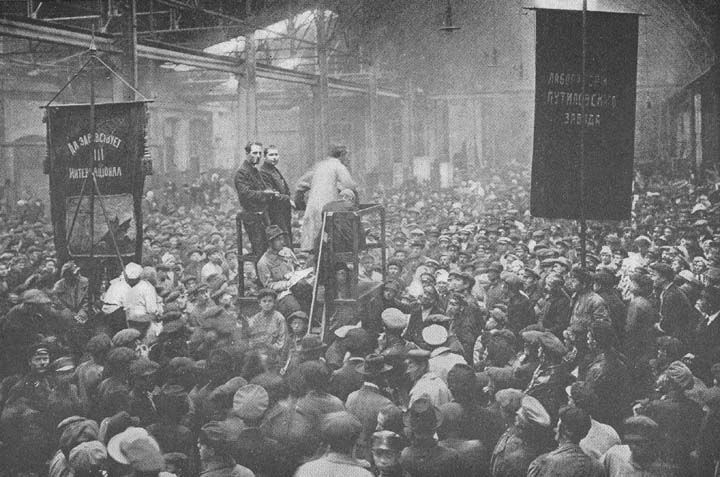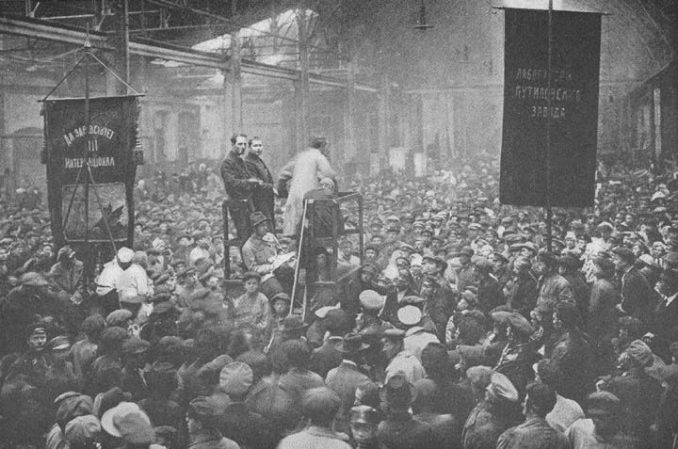

A factory committee meets during the 1917 Russian Revolution
The following slightly edited talk was given at a class on “Why We Need a Revolution” in New York City on Feb. 29.


A factory committee meets during the 1917 Russian Revolution
How do we deal with the mass injustice perpetrated by the capitalist ruling class? We can observe the current election and see clearly there is no electoral road to socialism. There is no electoral road to justice. The ruling class owns our so-called democratic process.
The politicians and officials in the Democratic and Republican parties are merely the employees of wealthy bankers, real estate executives and health insurance CEOs. They exist to do their bidding, and nothing more. Anyone attempting to use the capitalist democracy to increase the power of the working class, at the expense of the capitalist ruling class, will find their way blocked.
What then is the solution? If the interests of the working class are irreconcilably opposed to the interests of the ruling class; if the ruling class holds total control over the democratic process; how do we proceed? The solution is to abandon the specter of capitalist political power and embrace working-class power.
The strength of the working class is in our numbers and our labor. We greatly outnumber the capitalist ruling class. Even their security forces, the military and police — which make up the capitalist state — would be woefully outmatched by the forces that a united working class could bring to bear. And that is the key: the unity of the working class.
Separately, we are weak and powerless. United, we are unstoppable. A united working class could also withhold its labor from the capitalist ruling class. It is workers who power our economy. Factories, ports, shipping, supermarkets, fuel — all the vital arteries of our society are controlled by workers.
Should we be organized toward a single goal, if we were ever to withhold our labor, we would bring society to a grinding halt. This is how work-class economic power can create revolutionary political change.
The goal then must be to unite the working class. In order to pull off such monumental feats, the working class must be given a deep, highly structured organization. In order to combat the false democracy of the capitalist class, the working class must have a true workers’ democracy.
Learning from history
If we look back at history, every successful socialist revolution has followed this path. Though each revolution had different characteristics — driven by the material differences in their respective countries — all successful revolutionaries understood the importance of organizing the masses into a durable and democratic structure that could resist the ruling class.
In the Russian Revolution, it was the Workers Councils which drove the radicalization of Russian society. In Petrograd and other industrial cities, factory workers were brought together in democratically run councils. They debated and voted on measures which would improve their lives as workers. Being brought together in struggle against the bosses, they radicalized and grew bolder in their demands.
In February 1917, the workers of one Petrograd factory asked their bosses for an eight-hour workday. By October 1917, those same workers were demanding their bosses provide them with arms. It was through the process of democratic organization that workers began to learn their power. There are no shortcuts.
This pattern has held throughout the world. In China and Vietnam, village councils formed the backbone of the revolution, providing resources and security for China’s Red Army and Vietnam’s People’s Liberation Army. In Cuba, the backing of rural peasants gave cover to the guerrillas of the 26th of July Movement. Even today, in Bolivia and Venezuela, it is the neighborhood people’s councils that form the front line of the resistance against right-wing coup forces.
There are no shortcuts. The working class must be organized if we are ever to have a chance of defeating the capitalist ruling class. This must be done because it is our only hope of putting a stop to the injustices of class society.
By Cemile Cakir Türkiye March 23. Since the evening of March 19, millions of people…
Atlanta Atlanta letter carriers held synchronized protests across metro Atlanta, coordinated with actions around the…
Women leaders from Venezuela and Nicaragua held an open discussion, complete with Q&A, at a…
The following article was first posted December 15, 2023 on workers.org. “She who is a…
Download the PDF. Download B&W version. New Yorkers to protest billionaires’ rule Mobilize to stop…
Postal workers across the U.S. held hundreds of rallies on March 20 and 23 to…